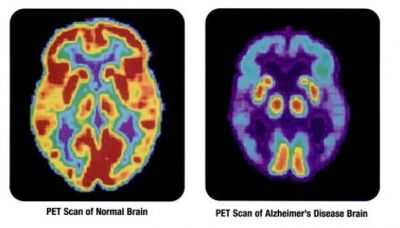Early detection of Alzheimer's

scan normal brain-alzheimers disease brain
By Health and Human Services Department, National Institutes of Health, National Institute on Aging : p.24[1] (Alzheimer's Disease: Unraveling the Mystery) [Public domain], via Wikimedia Commons
Alzheimer's disease (AD) is a neurodegenerative condition causing dementia and cognitive impairment. EU-funded researchers performed functional neuroimaging to study alterations in the brain's neuronal networks that correspond to memory impairment.
Amyloid accumulation in the brain has been linked to AD, but amyloid is also seen in many clinically normal people. The MCI_AD PIB-PET_FMRI project compared neuroimaging data from people with mild cognitive impairment (MCI), AD patients and healthy older individuals to elucidate AD pathobiology.
Neuroimaging techniques used to link memory function with amyloid accumulation include functional magnetic resonance imaging (fMRI) and the tracer Pittsburgh compound B with positron emission tomography (PIB-PET). Imaging data from the posteromedial cortex in the brain was used to study memory impairment during face–name association tasks.
Besides AD and MCI patients, analysis revealed that cognitively normal older individuals with high amyloid levels also had similarly aberrant functional neuronal response. Testing memory function with PIB-PET and fMRI could therefore be effective as an early diagnostic tool to distinguish between normal ageing and pathological neurodegenerative processes.
Early detection and treatment of people with MCI and those at high risk of AD could delay onset of AD symptoms. This would considerably improve their productivity and quality of life. Project findings could be the key to identifying alterations in the brain that predispose to AD with eventual application in a clinical setting.
published: 2015-04-27

